AMD Ryzen 7900x Review
Introduction
Just like the 7600x, the 7900x brings the Ryzen CPU-Lineup to a whole new level. With comparable single-core performance, the 7900x has something that the 7600x has not. A lot more cores. And this means a lot more Multi-Thread performance.
Positive
- Excellent Gaming Performance
- Excellent Single-threaded Performance
- Excellent Multi-threaded Performance
- Overclockable by default
- PCIe Gen 5 Support
- DDR 5 Support
- No Price Increase
- Integrated graphics
Neutral
- 170W TDP
- New Socket
Negative
- Requires good cooling
Ryzen 7000 Lineup and Pricing

On September 27, 2022, AMD's Ryzen 7000 lineup of mid to high-tier CPU launches. Similarly to the Ryzen 5000 launch in 2020, there will be 4 models available immediately:
- Ryzen 9 7950X
- Ryzen 9 7900X
- Ryzen 7 7700X
- Ryzen 5 7600x
Although launching 4x models at once can be seen as a tradition by now, this year's Ryzen Lineup will not feature a Ryzen 7 X800x, but a 7700X instead. As of now, there has been no announcement or confirmation of additional CPU's for the near future. However, as AMD has filled up its lineup with other models in the past, we believe it is just a matter of time until a 7800x/7300x/... will be unveiled.
| Name | Ryzen 9 5950x | Ryzen 9 5900x | Ryzen 7 7700x | Ryzen 5 7600x |
| Price | $699 | $549 | $399 | $299 |
| Core/Threads | 16/32 | 12/24 | 8/16 | 6/12 |
| Base Clock | 4.5GHz | 4.7GHz | 4.5GHz | 4.7GHz |
| Boost Clock | 5.7GHz | 5.6GHz | 5.4GHz | 5.3GHz |
| Cache | 80MB | 76MB | 40MB | 38MB |
| TDP | 170W | 170W | 105W | 105W |
Pricing

Although we have expected it, the new Ryzen 7000 does not come with a price increase. Quite the reverse! While the Ryzen 7600x and 7900x are getting the same price tag as their Ryzen 5000 predecessors did, the 7950x got a $100 price reduction over the last generation's predecessor.
AM5 Socket
Although the price stayed the same (or lower) despite inflation, upgrading to a new Ryzen 7000 CPU is not as easy as it was before.
With Ryzen 7000, AMD introduced 4 new types of Chipsets: X670E, X670, B670E, and B670. All of which, are using their new AM5 Socket.
Since the first Ryzen CPU as well as most other CPUs before that, AMD has been using a PGA system for their chips. In contrast to Intel, the connecting pins between the CPU and the Motherboard have been sitting on the CPU side.
With this year's Ryzen 7000 lineup, this will change. From now on, AMD's Ryzen CPUs will rely on the same approach Intel has been using for decades.
.png)
This does come with quite some consequences though. One of Ryzen most beloved features is it's backward and forward compatibility. Not only did AMD keep up their promise of making their Motherboards and CPUs compatible for an unprecedented amount of time. The moment their customers wanted to enlarge this timeframe for the Ryzen 5000 Line, AMD followed their wishes.

With the introduction of a new socket, however, keeping this promise becomes an impossible task.
Therefore, although the prices have not increased, an upgrade to a Ryzen 7000 CPU will not only include the CPU and a new Motherboard, but also a new Set of RAM as Ryzen 7000 is simultaneously updating its socket and RAM generation.
Zen 4

Zen 4 is the architecture powering AMD's new Ryzen 7000 Lineup. Similarly to Zen 3, the new iteration still features up to 2 CCDs, however, this year it is built on TSMC's 5nm process.
Hidden under the generational number increase is also a doubling of L2 Cache, Up-to 15% IPC increase, DDR 5 support, PCIe Gen. 5 Support and 5Ghz boost by default.
On the higher end, Zen 4 is limited by a maximum of 24 cores, a version that may come out at a later date.
A useful addition to Zen 4's capabilities compared to previous versions is the mandatory addition of AMD's RDNA 2 graphical unit. Although it has been emphasized multiple times by AMD, and we would confirm it, it is NOT a Game-ready GPU. Featuring only 2 cores at 2200Mhz, this miniature of a GPU is meant to be used solely to run a monitor.
Thanks to the addition of a iGPU, debugging of a system has been made much easier.
Benchmarks
Testing Equipment
In order to fully explore the Ryzen 7900x's capabilities, we compared it to the previous Ryzen lineup as well as Intel's 12th Gen Lineup.
The Ryzen 7000 Benchmark setup consists of a Gigabyte Aorus Master X670E in combination with 2x sticks of G.Skill TridentZ5 Neo DDR5 6000MhzCL30 16Gb.
The Intel 12th gen setup consists of an ASRock Z690 Taichi motherboard combined with the exact same ram used in the Ryzen 7000 Setup.
The Ryzen 5000 setup consists of an Asus X570 motherboard and 2x sticks of Thermaltake Thoughram 3600Mhz CL18.
Each setup has been used with an individual Samsung 980 Pro SSD, a be quiet! Dark Power Pro 12 power supply and an Asus TUF RTX 3090 TI GPU.
The result of each benchmark shown below is an average value gained upon 3 individual runs.
Synthetic Benchmarks
Cinebench R23 Single Thread
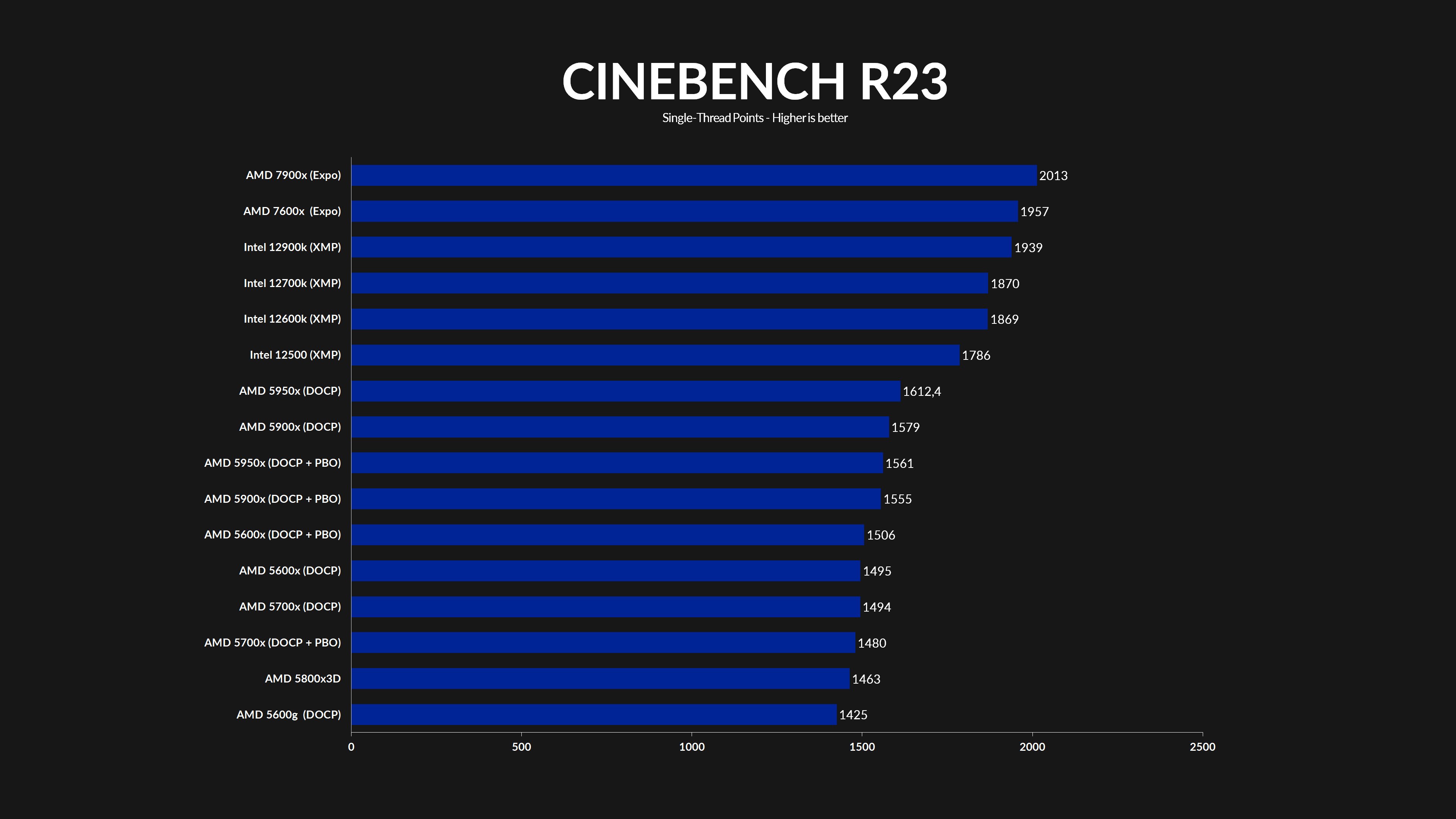
In Cinebench R23, the 7900X started off strong. With 2013pts, it managed to reach the top of the benchmark list while being our first CPU to score above 2000pts in R23.
Cinebench R23 Multi Thread
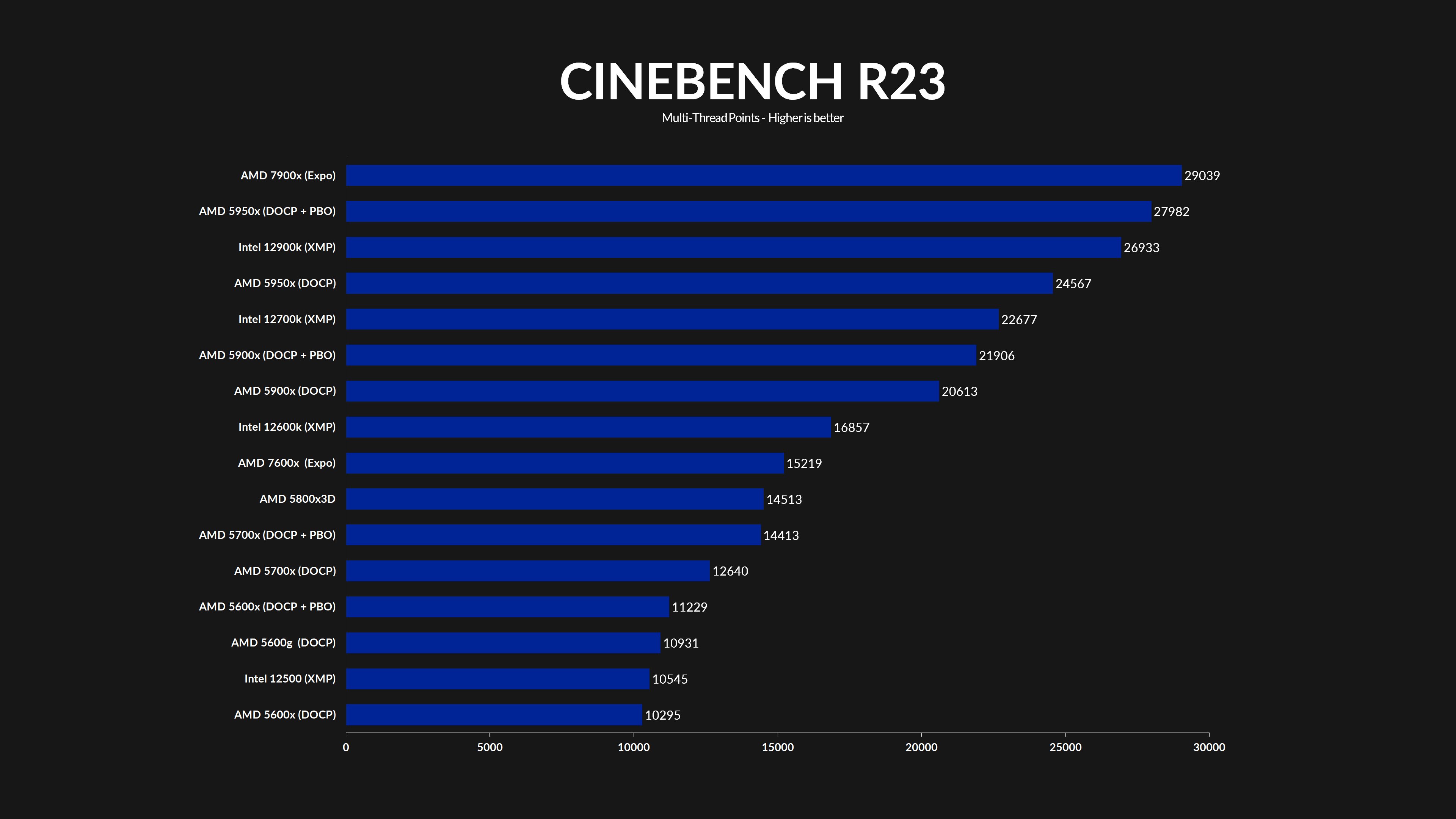
Cinabench R23 Multi showed how far advanced the 7900x truly is. With slightly over 1000points ahead of the last generation's 5950x, and even more compared to the 12900k, the 7900x took the first spot on our list.
PCMark 10
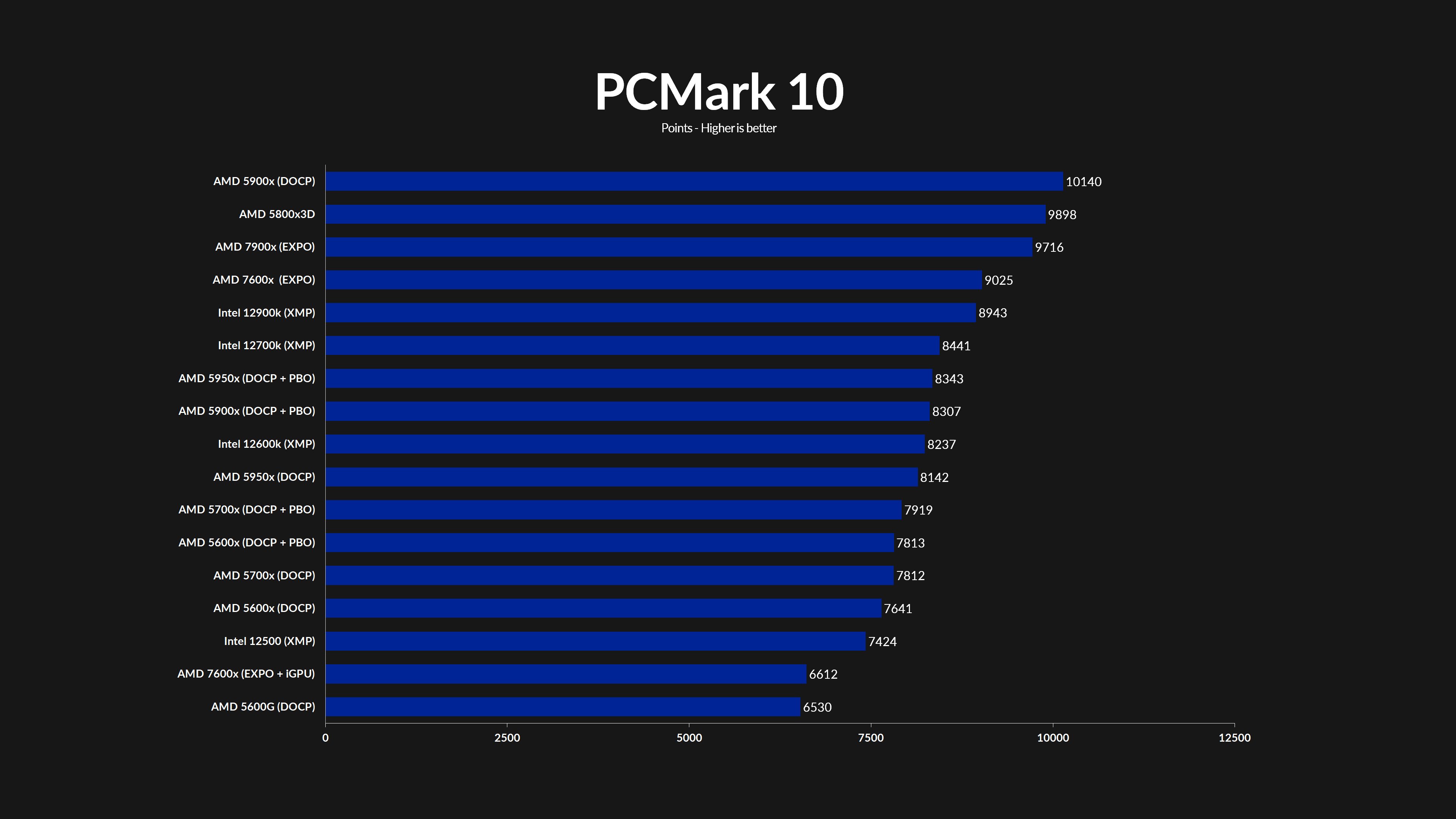
In PCMark 10, the 7900x scored 9716pts, just a few points behind the 5800x3D. Interestingly though, the board topper of this category is the last generation's Ryzen 5900x.
Handbrake h264-h265
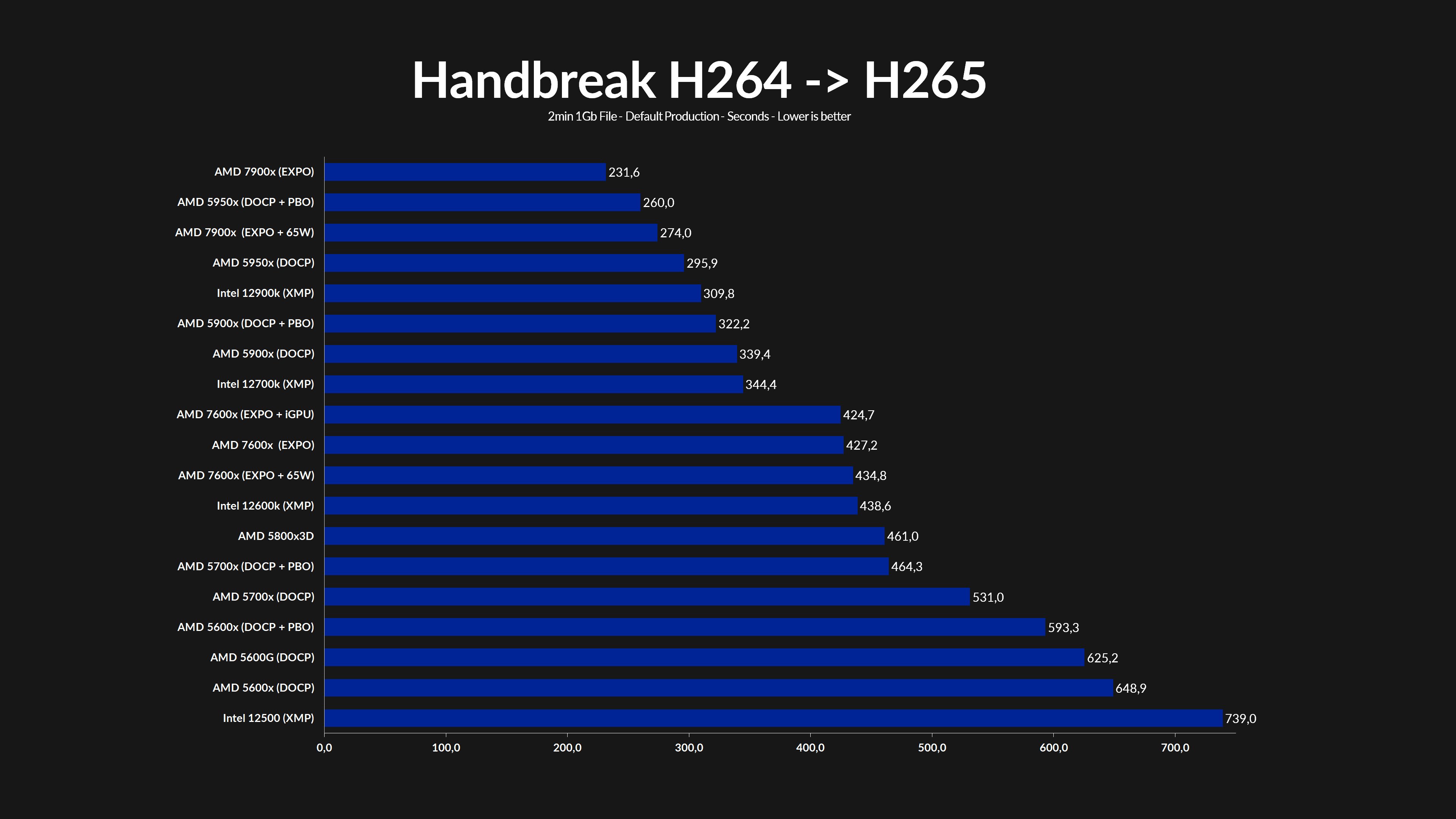
Transcoding a 2-minute-long video into H265 took 231.6 seconds for the 7900x, positioning it at the very first place on our benchmark chart. The comparable 12900k landed behind the 5950x with over 300s.
Premiere Pro
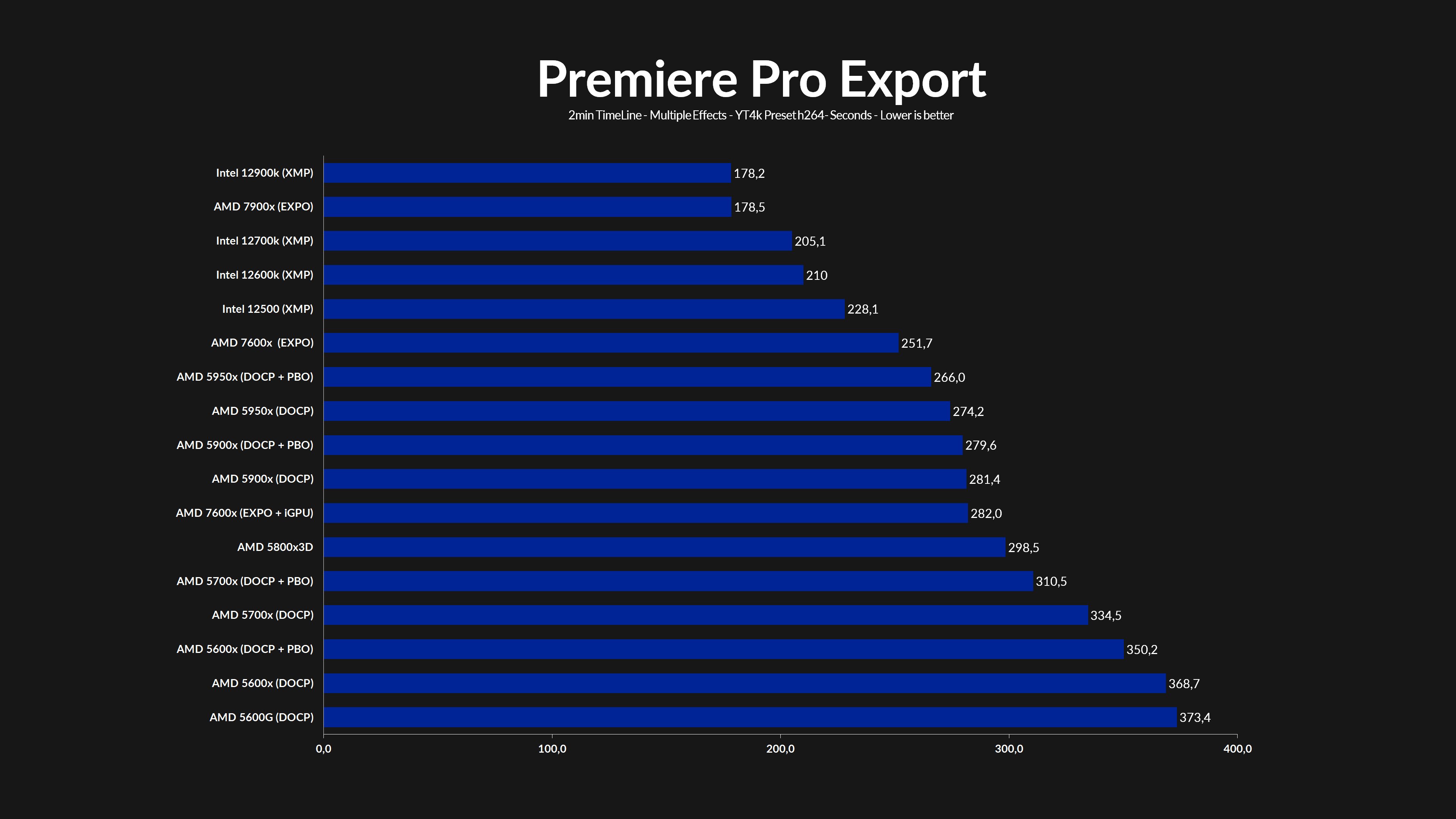
Rendering a 2 minutes timeline in Premiere Pro took 178.5 seconds for the 7900x. Although it landed in second place, we believe this to be a substantial increase compared to the previous generation's 281.4 seconds due to the integrated encoder not yet being implemented in PP. We believe this score might be open to some heavy changes once Adobe catches up.
Time Spy
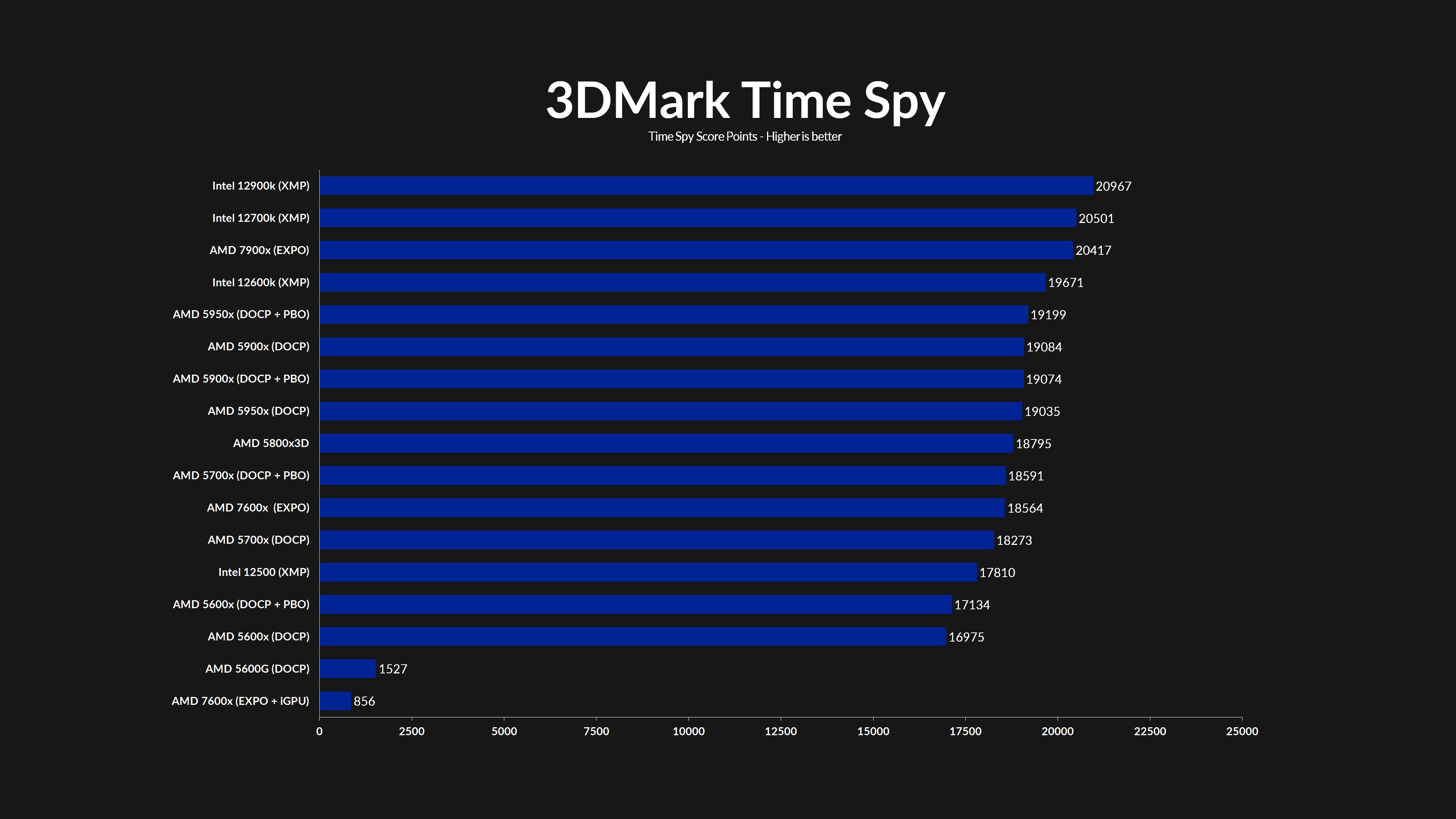
In 3DMark's Time Spy, the 7900x managed to core 20417pts on a general level, while the CPU-only score landed on 16019pts. In both cases, this positions the 7900x shortly behind the 12700k, and a bit behind the 12900k.
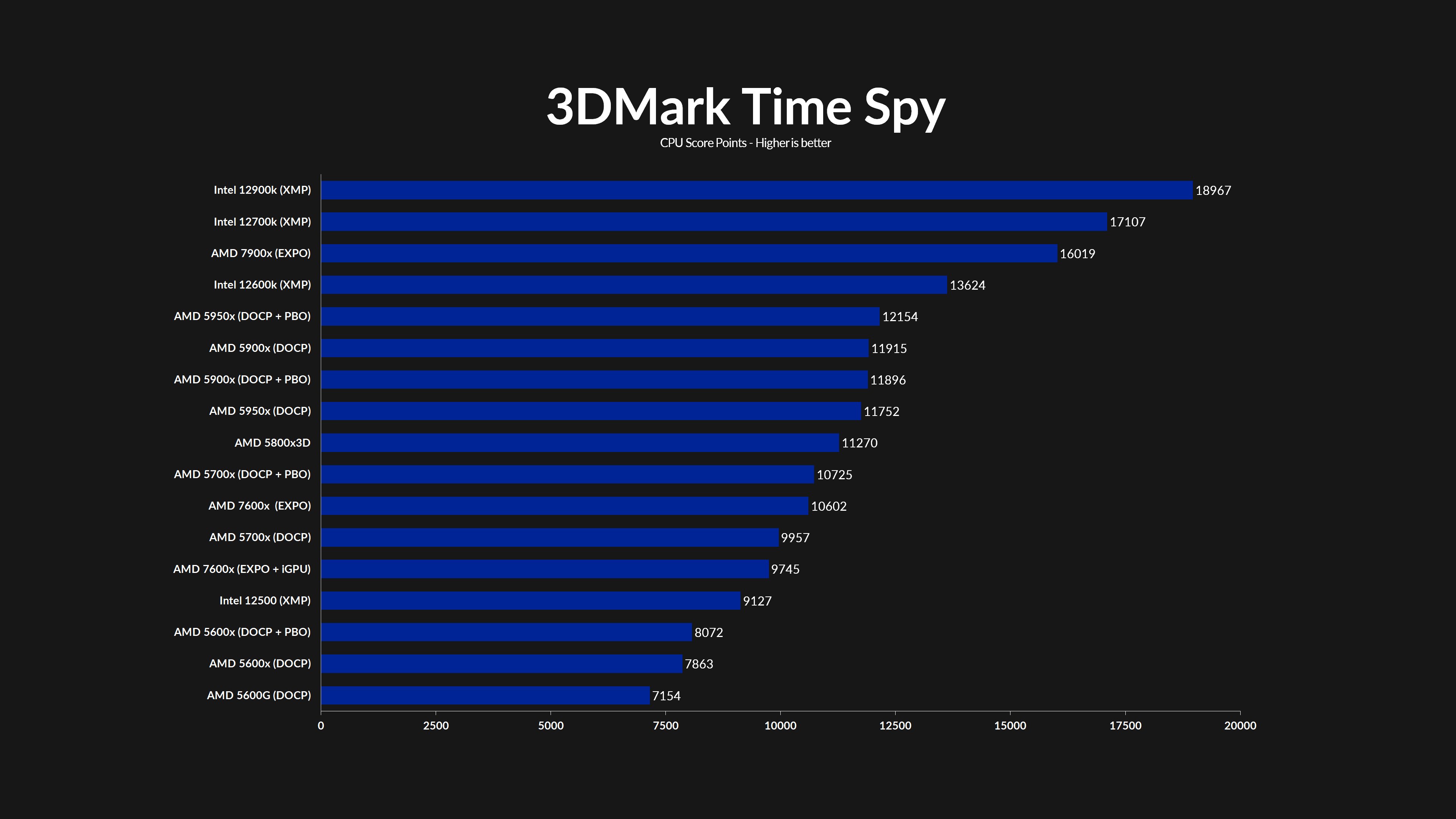
Corona Render
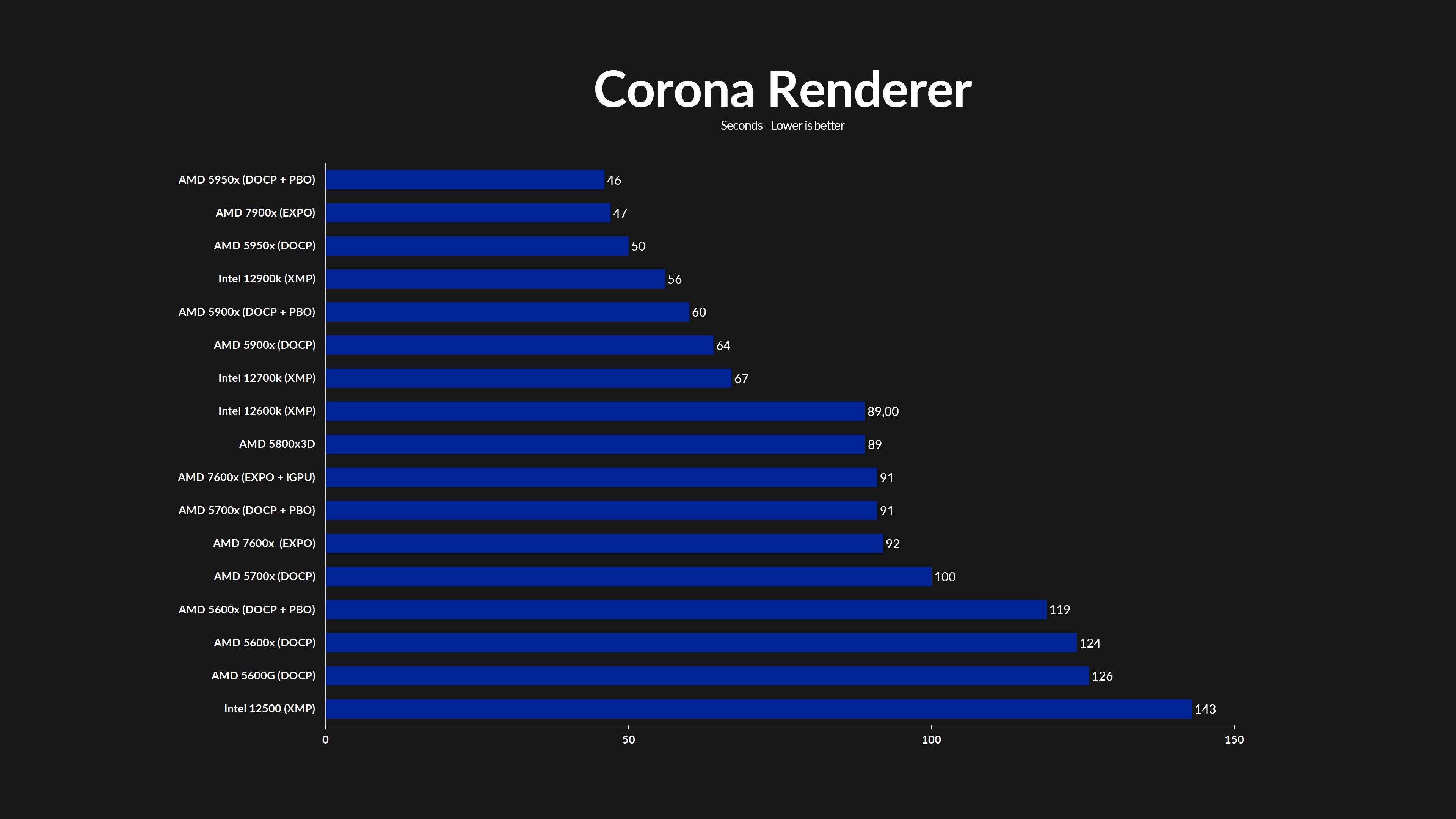
Rendering the usual Corona image took the 7900x 47 seconds, just a second longer than last generation's 5950x, and 9 seconds quicker than the 12900k.
Blender
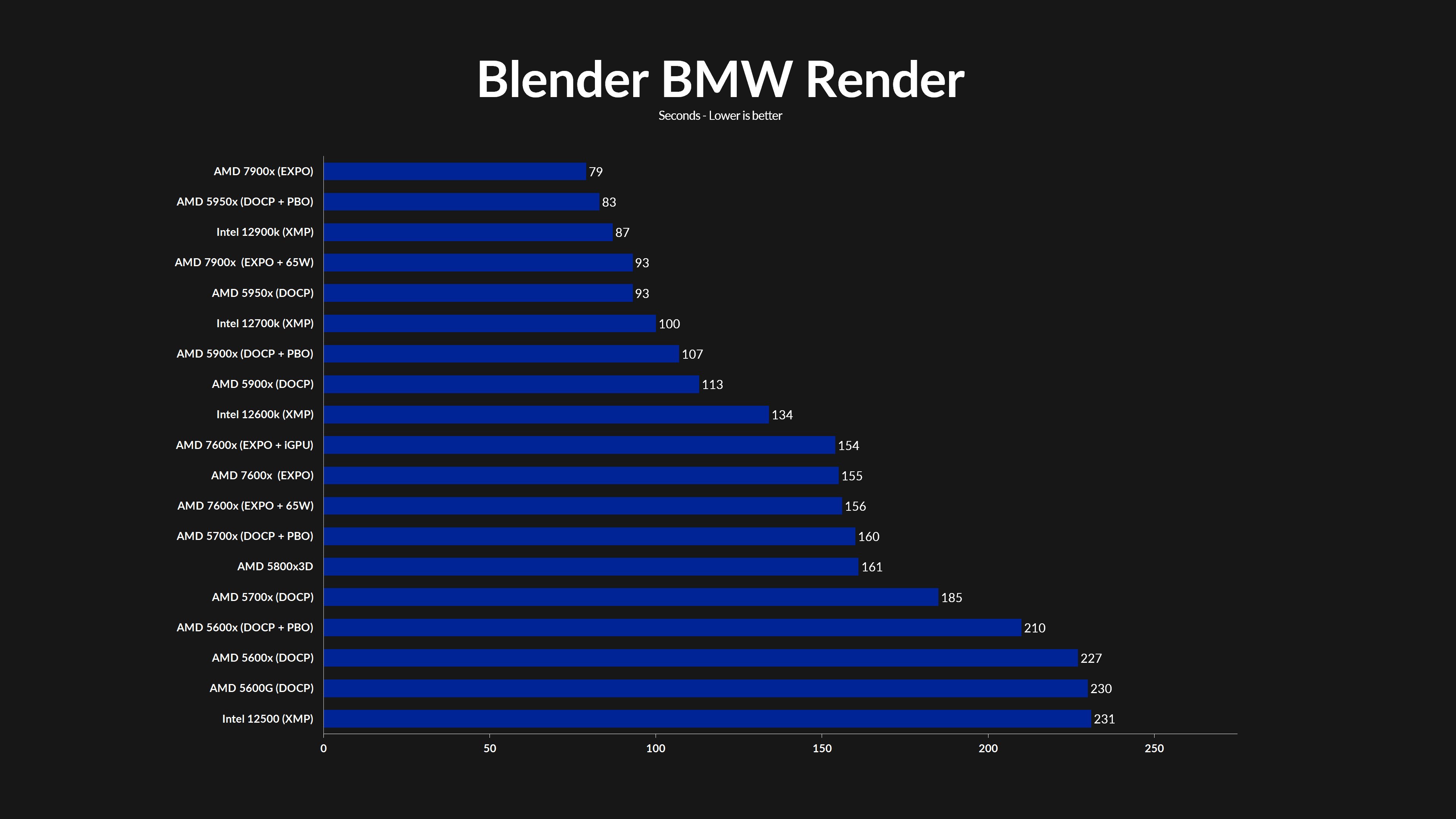
Finishing the Blender BMW render took a total of 79 seconds. This places the 7900x again at the very top of our benchmark list.
3DMark CPU Profile
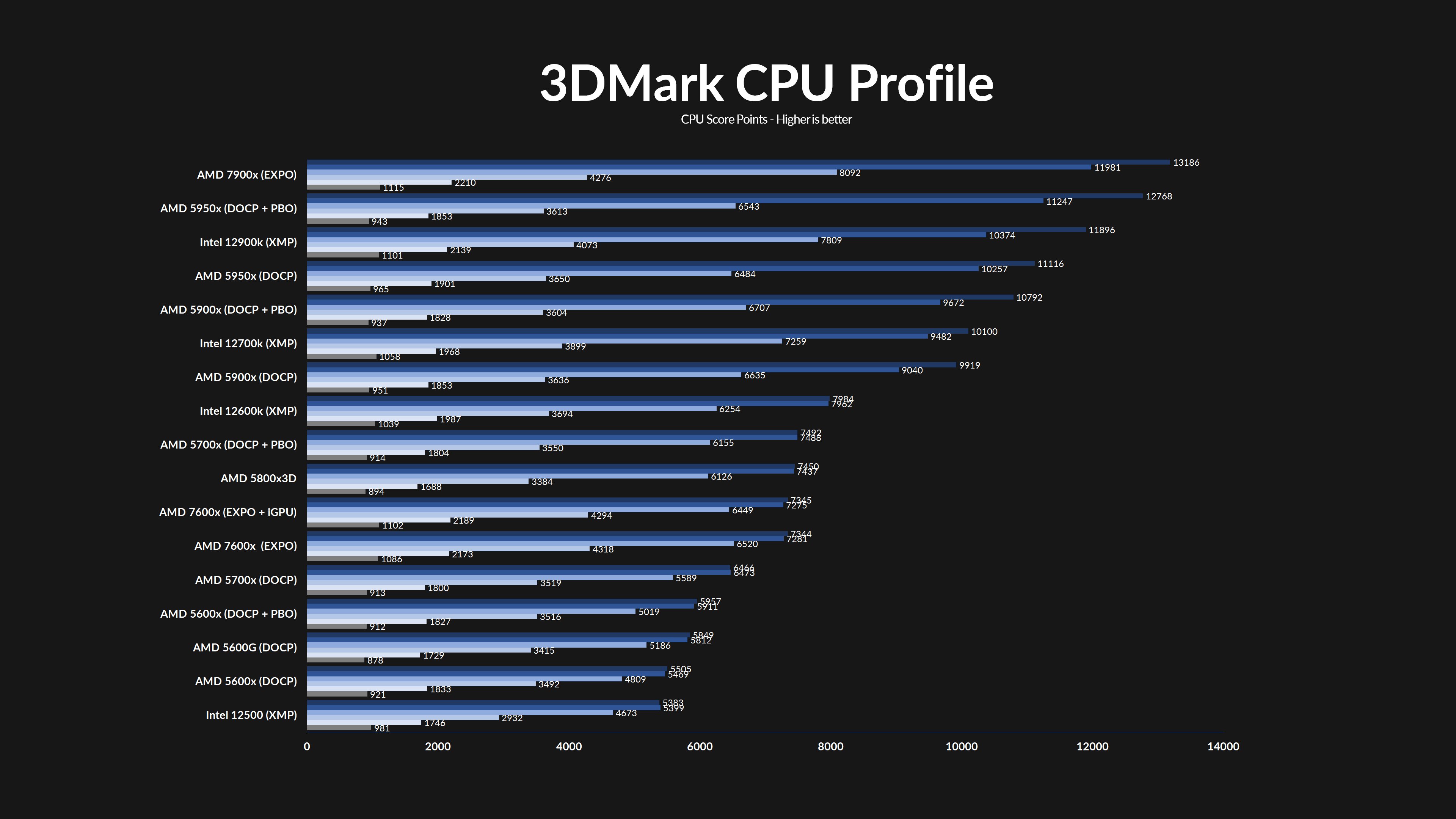
3DMark's CPU Profile Benchmark allowed us to see the consistency of the new Zen 4 chips. While both the 7600x and 7900x performed almost identically until 8 threads were being used, the 7900x took off afterward making to the top of our list with 13186pts.
Gaming Benchmarks
Shadow of the Tomb Raider
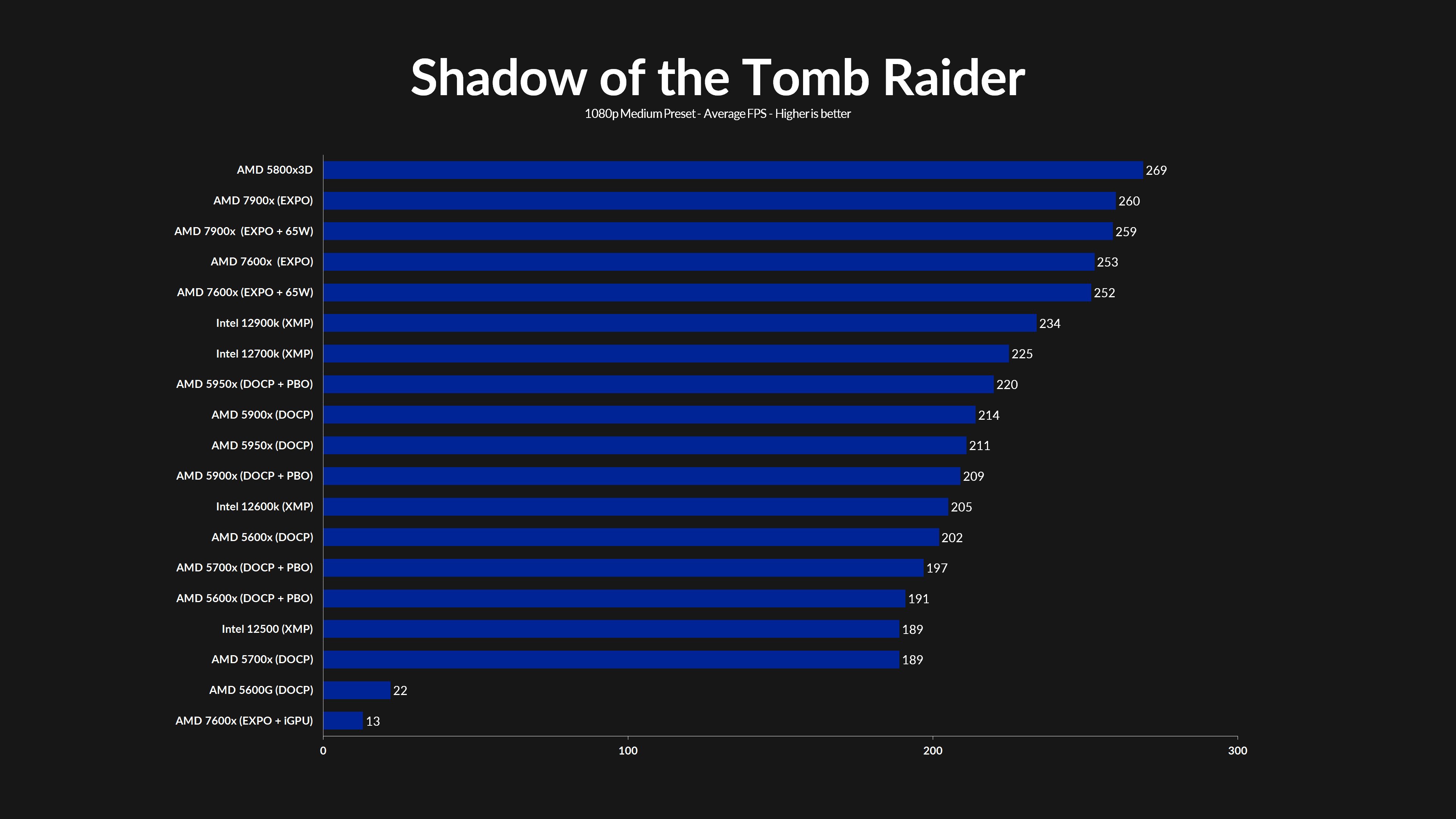
In Shadow of the Tomb Raider, the 7600x managed to keep the counter at 260fps on average. This positions it 9 fps behind the 5800x3D, but in front of the 12900k which scored 252fps.
Far Cry 6
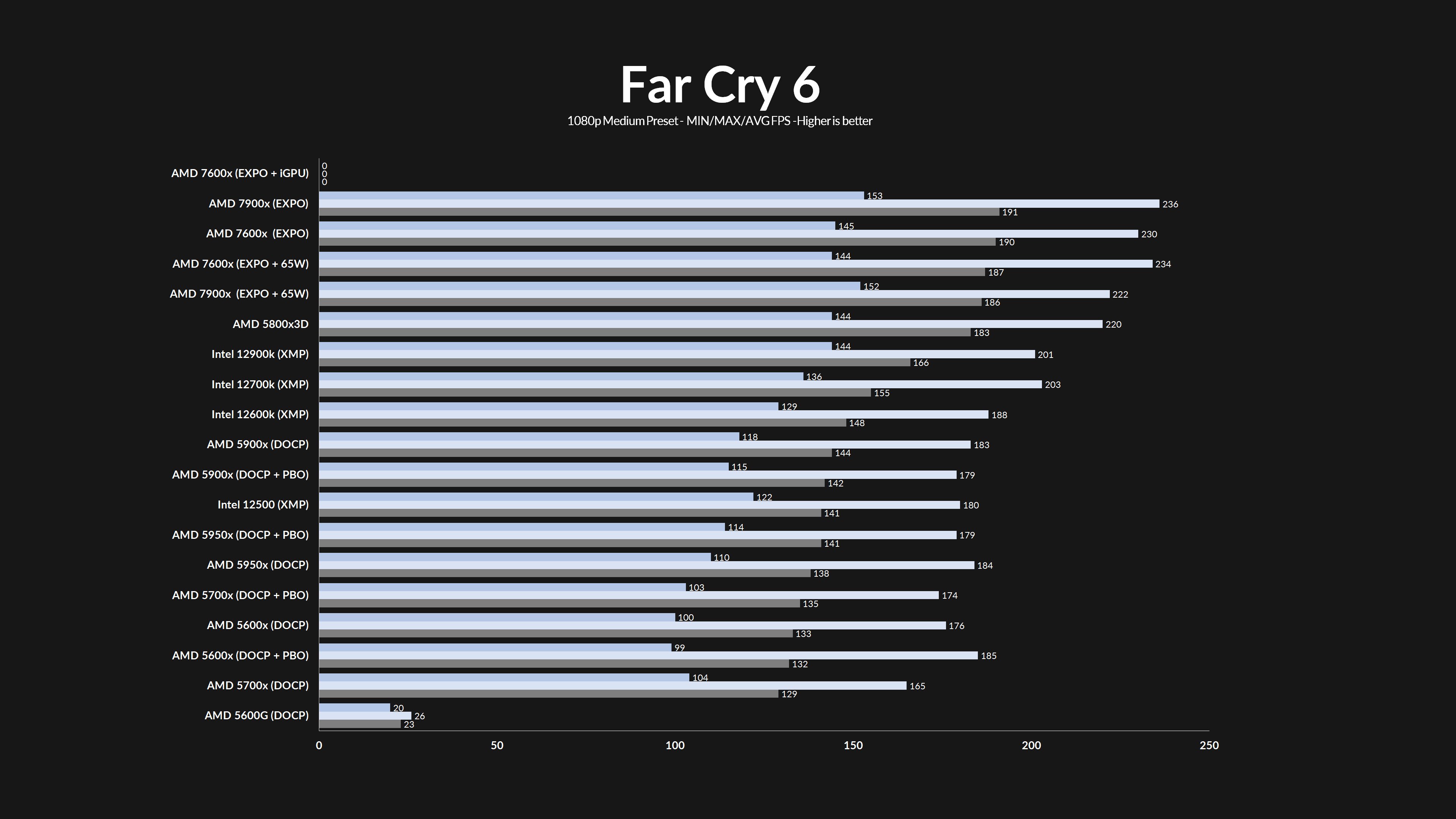
The build-in-benchmark of Far Cry 6 showed that the 7900x managed to keep the game at a very smooth 191fps. This positions the 7900x ahead of everybody else, including the 12900k which scored a comparably low 166fps.
Metro Exodus
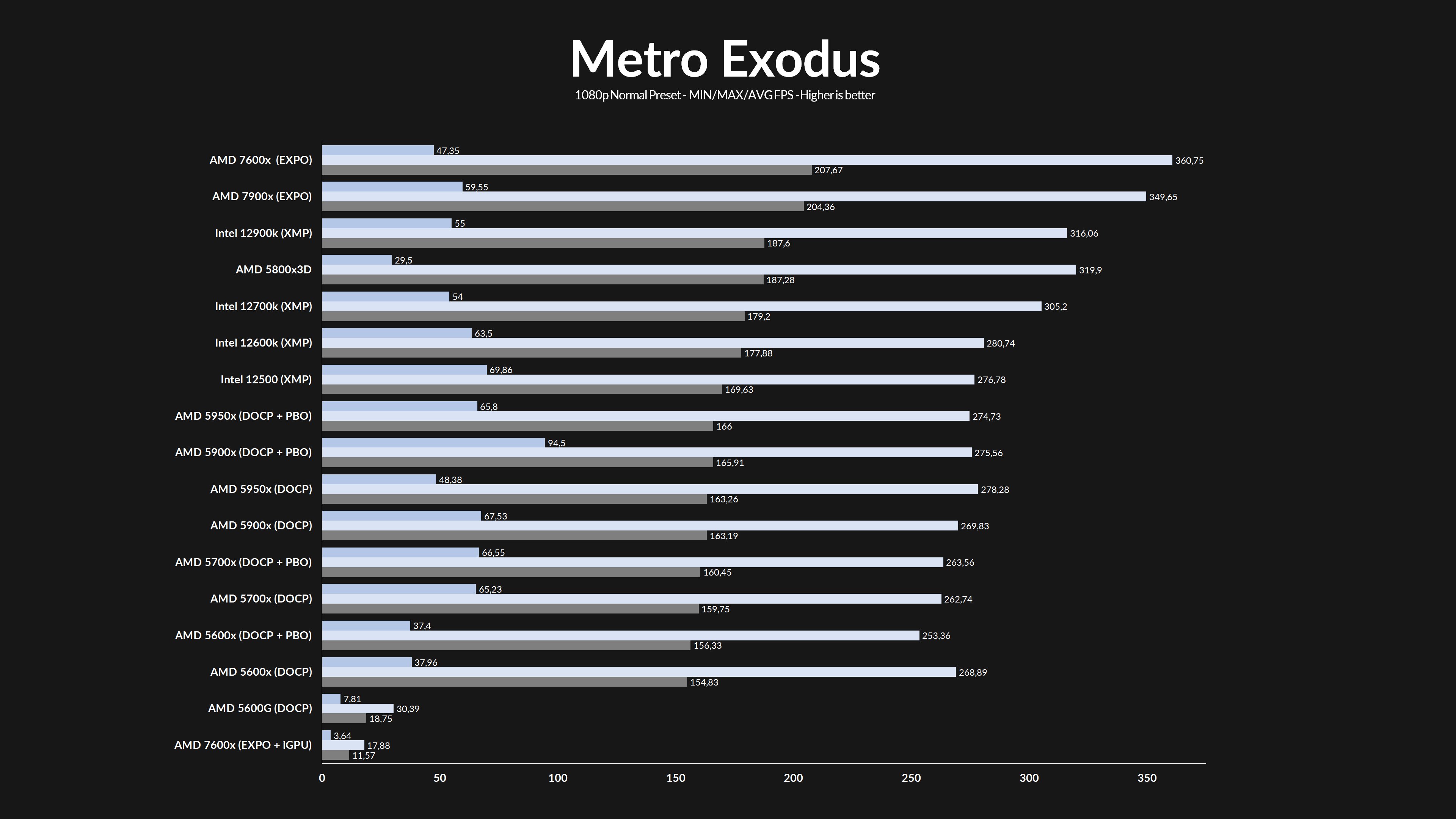
In Metro Exodus, the 7900x managed to keep the average FPS counter above 204 FPS. This places it quite a few FPS in front of the 12900k.
F1 2020

In Formula 1, the 7900x managed to keep the game running at 447FPS. A ridiculous upgrade compared to the already good 318FPS that the previous generation was able to run the game at. Compared to the 356fps achieved by the 12900k, this presents a substantial upgrade.
Ryzen 7900x vs 5900x
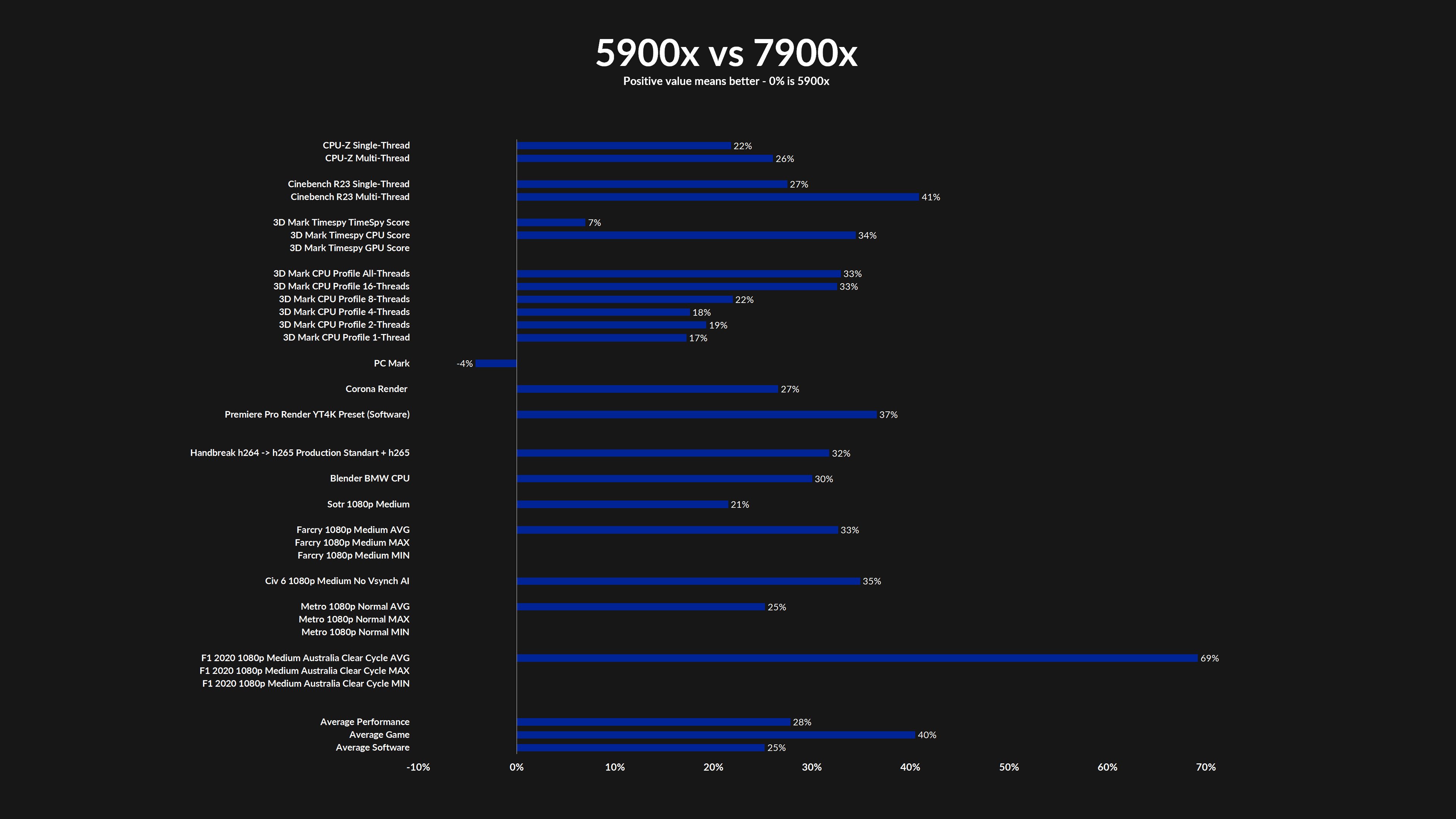
Comparing the 7900x to the previous generation's 5900x reveals how much of an improvement this truly is.
Overall, the Performance increased by a whopping 28%. This number consists of a 25% increase in Work-related Software and Synthetic benchmarks, and a 40% increase in gaming performance.
All in all, a 28% generational performance increase is a huge step forward making the 7900x a worthy candidate for a power user's machine.
Ryzen 7900x vs 12900k
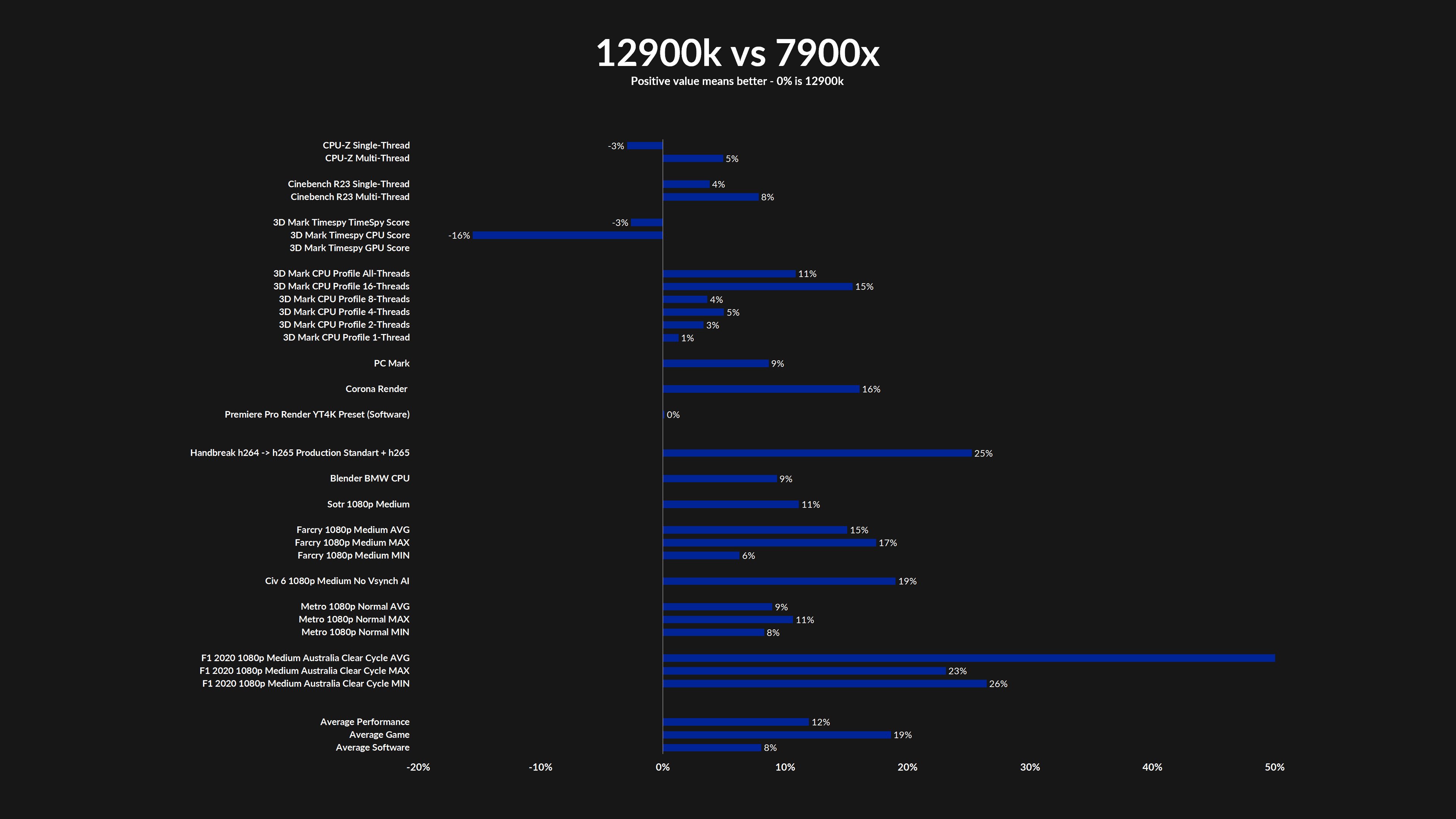
Comparing the 12900k to the new Ryzen 7900x revealed to us how sour the situation for Intel is at this time. While the 7900x managed to bring a 12% general performance increase, it managed to out beat the i9 by 19% in games.
But the 8% increase in production software is the number that should hurt intel the most. The i9 and R9's are mainly aimed at working environments. A category in which Intel held the reins until today.
From here on, however, the benefit of using a 12900k are diminishing and maybe even nonexistent.
The interesting part about this for us, however, is that the 7900x is not AMD's top-tier model. The 7950x is. And although we did not yet have the pleasure to work with it, we can imagine how the 12900k stands against it, or not.
Summary
.png)
The Ryzen 7900x is truly a powerhouse. Looking back on all of the benchmarks, the 7900x managed to score the first spot in most of them. Additionally, it managed to dethrone the 12900k in both gaming and work-related performance.
Compared to the previous generation, the 7900x improved in every aspect. In both gaming and work performance, it managed to outperform its predecessor by a huge margin and even managed to outperform the higher-tier 5950x in most benchmarks.
.png)
One of the best aspects in our opinion, however, is its price. As of now, the 7900x is the most powerful CPU we had the pleasure to work with. Shockingly for us, however, it is not the most expensive one. The 12900k being more expensive puts a heavy weight on Inte's 13th gen lineup. But it also allows users that are not willing to spend a whopping $800 for a top-tier CPU, to get an excellently performing one. Although we are unaware as of now how the 7950x performs compared to the 7900x, we are strongly assuming that it scores between 5-10% higher on every benchmark, especially those that are multi-thread oriented.
.png)
Looked at as a product, the 7900x is an amazingly well-made mix with the best of both worlds: high-end working CPU and high-end gaming CPU.
However, as the Gaming benchmark showed, the difference between a 7600x and 7900x only shines while playing games. Therefore, we believe the 7900x should be treated as what it is, a heavy-work-oriented product.
Taking the Price into consideration, we believe the 7900x will be an excellent (slightly budget) oriented CPU aimed at people who want to perform difficult tasks while keeping the door open for gaming. Inline everything above, the highest recommendations from our side.

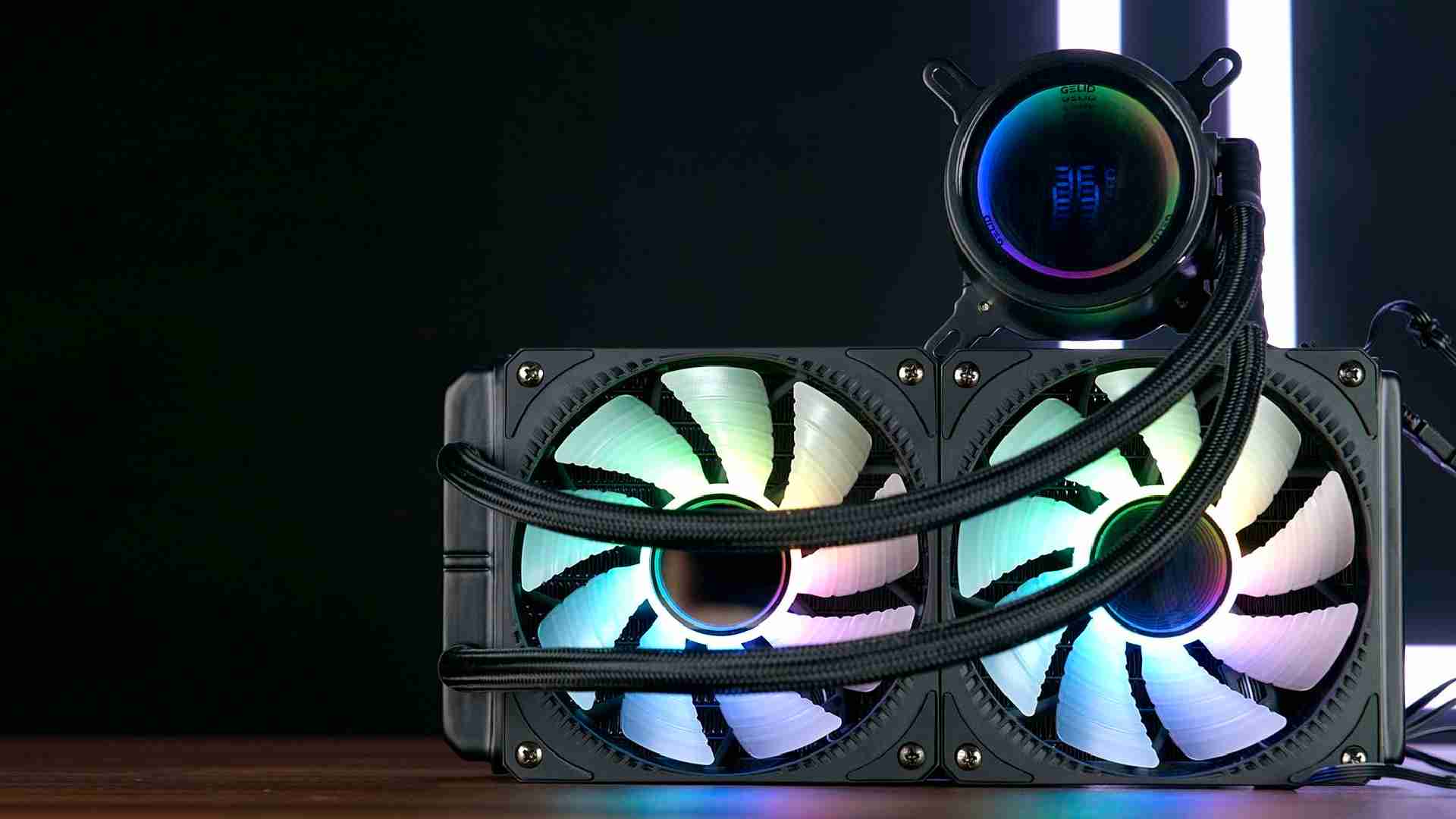
Gelid Liquid 240 Review
Although the Gelid Liquid 120 did not perform exceptionally well, this might have been caused by the form factor alone. Lets
Read More
AMD Radeon RX 7900XTX Review
It is time to take a closer look at the new AMD Radeon RX 7900XTX and see how it compares to Nvidias 4090 and 4080. We will
Read More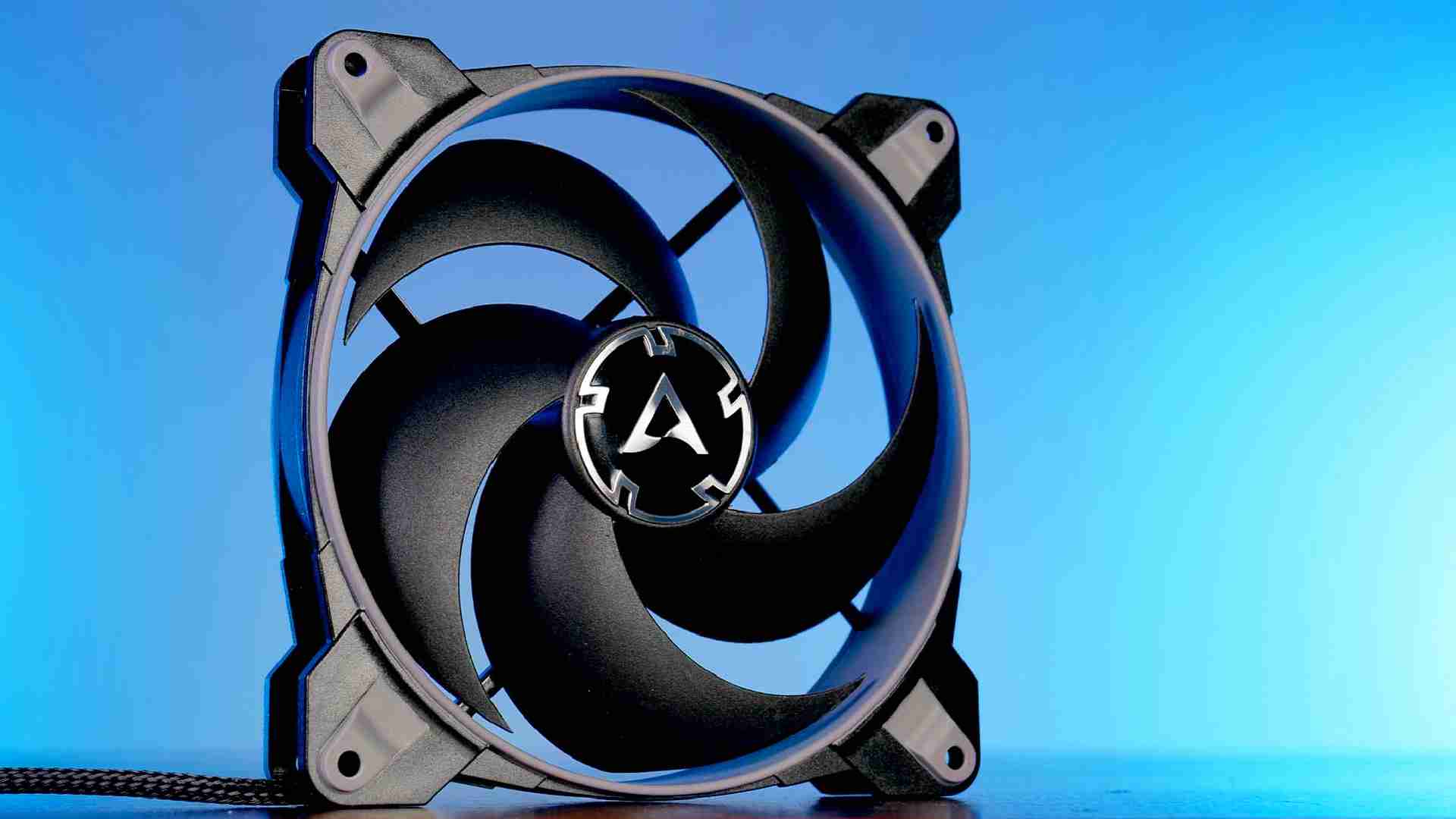
Arctic BioniX P140 Review
Arctics BioniX series already proved itself to be an overpowered version of their Normal P and F counterparts. After the 120m
Read More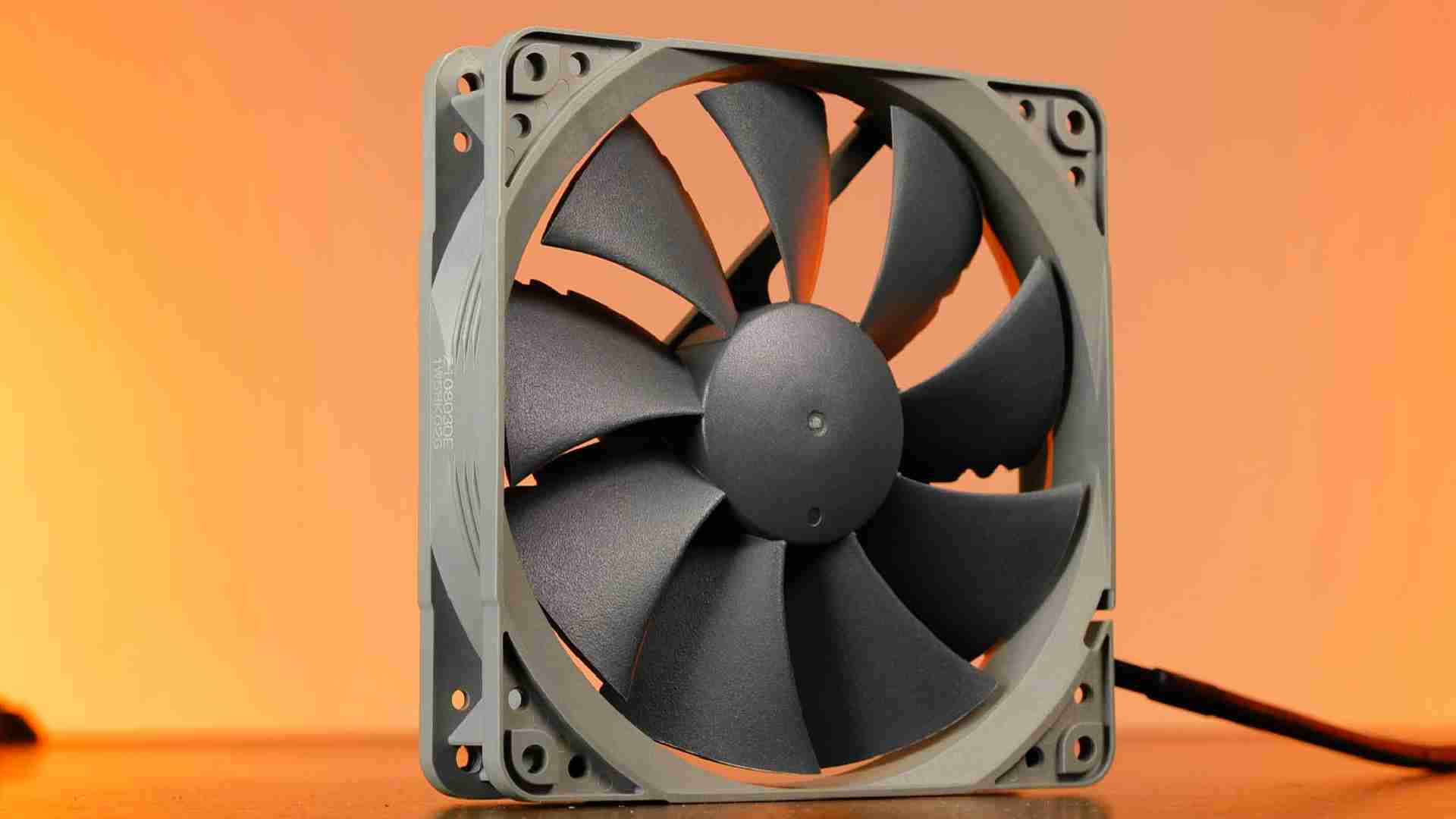
Noctua NF-P12 Redux Review
While other Noctua Redux fans were already able to convince us, today it is going to be all about the Noctua NF-P12 Redux, a
Read More